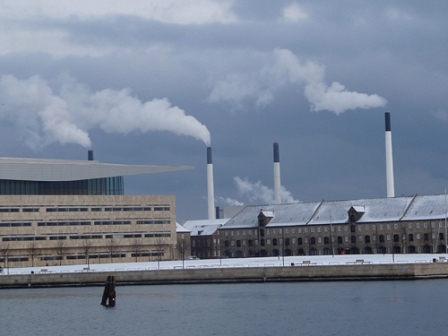Erstellt am: 11. 2. 2010 - 12:19 Uhr
Climategate, Glaciergate
It's been a devastating few weeks for the movement for action against climate change.
Two high profile gaffs involving climate scientists, inevitably trumpeted out ad nauseam by the climate deniers, have led to major crisis of public confidence in the scientific consensus on which the momentum of the movement was based.
By all serious accounts the scandals have done very little to impact the canon of climate science, but they are certainly already impacting the public's already weak willingness to see the problem tackled. Our trust in the accepted science of climate change is vital and so cracks in the trust, however small, are a serious matter.

University
Following the story of climate change (and covering it as a journalist) is always difficult given that much of the evidence is too difficult to interpret for all but a few elite scientific experts. Therefore our understanding and willingness to act on a problem that is going to affect us all is reliant on those experts relaying the evidence to us in a reliable and open way. And that trust has to be overwhelming, since the implications of mainstream climate research is that we face lifestyle sacrifices and potential threats to our immediate economic growth if we are to meet the challenge that the scientists have outlined.
First came Climategate. Emails were stolen from the University of East Anglia’s climatic research unit, led by Professor Phil Jones, which seemed to suggest that the climate scientists were trying to avoid handing over their data to sceptics, that they deleted emails and even, in one case, it seemed at first glance, recommended ignoring inconvenient data. The Financial Times called the gaff “outrageous".
Faked science?
As is often the case, the headline is more damning than the story. In recent years, non-scientist sceptics, some of them well funded by commercial interests, had been constantly demanding access to their date via the Freedom of Information Act and then cherry-picking sections to use for suit their agendas. You can see why scientists baulked at their time being “wasted” in that way. They felt that deniers with a political rather than scientific motive were using the requests, in the words of climatologist Ben Santer "as a calculated strategy to divert my attention and focus away from research." The scientists' response was to develop a sort of siege mentality that was understandable on a human level but unhealthy on a scientific one.
Chris Cummins
The tone of the emails was often flippant, but the tone of intercollegial emails often are. I'd be horrified if my emails were published. And it is perhaps it is more important to note what this massive scandal doesn’t show: evidence of spiked science. After a major piece of journalistic investigation the Guardian’s Fred Pearce concluded that there was “manifestly no evidence of clandestine data manipulation”. The omitted data it seems was ignored for sound scientific reasons.
Still for everyone who reads Pearce's analysis, how many have just read the damning original headline. Mud sticks.
Yet perhaps more damaging than the emails was a scandal that has become known as “Glaciergate”. If trust in science is vital , then the UN Intergovernmental Panel on Climate Change has a key role. And it has rather fluffed it.
The IPCC reports have become the sort of policy-making bible on current knowledge on climate change. By the latest ‘stone tablet’ they included a prediction that the glaciers would melt by 2035 which turned out to be a gross overestimate. Rather than being based on any peer-reviewed research science, it was based on a media interview with a scientist conducted in 1999. Indeed the IPCC has been accused of citing essays by the WWF and Greenpeace as though they were serious academic studies. It has led people to justifiably question whether the processes used by the IPCC to assess knowledge are trustworthy.
The IPCC’s chief, the 69-year old Indian academic Dr Rajendra Pachauri, refuses to apologize for this oversight, although it appears he was aware of it well before Copenhagen. Instead he simply reiterated that the body of science is sound, that the massive report uses as many sources as possible in its aim to be comprehensive and that the “isolated mistake” about the glaciers didn’t affect the "basic truth" of the panel’s 3,000 page report. That might be correct, but at a time when the public needed reassuring it seemed haughty. He had to opportunity to engage with public concerns, but instead he just batted them away.
Pachauri, who has just published a steamy novel about an Indian environmentalist in his 60's with an insatiable libido, might have done better to have better spent his time ensuing the the IPCC vow to scrutinise "every statement in every sentence” was fulfilled.
You can feel sorry for the authors of the reports. They aimed to make their report as comprehensive in scope as possible and, mostly working in their free time, put together a huge dossier. One clanger in 3,000 pages might not seem like a big deal. In Pachauri’s words, Glaciergate was a “human mistake”. Furthemore it was unearthed and publicized by the scientists themselves, rather debunking the suggestion that they are a sinister masonic secret society.

Chris Cummins
Vicky Pope, the head of climate change advice at the Met Office, points out that these mistakes, both at the University of East Anglia and in the IPCC report, have all been about the impacts of climate change – "perhaps one of the most difficult areas of research and one which is evolving rapidly." She points out that none of them "call into question the fundamental science."
But the PR damage has been done. It seems that Pachauri, who was reportedly notified of the mistake back in November, took too long to react and correct the mistake. He should have been aware that the deniers would cash in on any suggestion of impropriety. For the deniers, who trade in uncertainty, the "isolated mistake" was manna from the warming heavens.
Sarah Palin may have resorted to writing her speech notes on the palm of her hands, but that hasn’t stopped apparently stopped her winning the argument on global warming in the USA right now, helped, however absurdly, by the current cold snap. Predictably, the sceptics have seized the opportunity to claim that the whole edifice of climate change science is now crumbling. 3 months after the Copenhagen climate conference, and with the mood of the US population seen as critical for any move forward on action against climate change, the US commentator Walter Russell Mead says the deniers are winning. “Sarah Palin 1, Al Gore zip,” is his scorecard in an article in which he wrote that “the global warming movement as we have known it is dead.”
chris cummins
That seems be an exaggeration that outweighs Glaciergate, particularly on this side of the Atlantic. We haven’t heard any major government, save Saudi Arabia, announcing that the scandals have affected their policy. But to a great extent, in the West at least, it has been the public that has been pushing the politicians for action. Is it that some climate scientists seem to think we are too dumb to understand the nuances and grey-areas of complicated scientific data? Do they think they we can't cop with the inherent uncertainty of predictions about the rate of global warming? I'm afraid they have to. The recent scandals show that if they want to win public trust, they have to trust the public more. As far as is possible, we need to understand the problem ourselves.
There have been calls for a reform of the IPCC, notably from senior Chinese climatologist Lü Xuedu – who told the Guardian it should reduce its ‘western bias’ and invest in research institutions in developing nations. He also suggested it should update itself. The IPCC was formed in 1988 and its massive reports, delivered with several years interval, seem to some observers to be all a bit ‘last century’. Mike Hulme, who is the professor of climate change at the now under-fire University of East Anglia, suggests the panel needs to produce briefer reports on particular climate topics every year and be able to respond quickly to new studies and critiques. And, as the Financial Times put it, a “considerably more humility” from the climate scientists might help.
This time last year I remember the Copenhagen climate summit was being heralded as “the blue-print to save the world”. But now just a few weeks after it ended in failure, there's a sense of weary disenchantment. Polls show that climate scepticism is on the rise. And it's beginning to show. A Guardian survey of over 30 leading figures involved in climate negotiations found almost none who believed a global deal was possible this year. Good-bye optimism.


